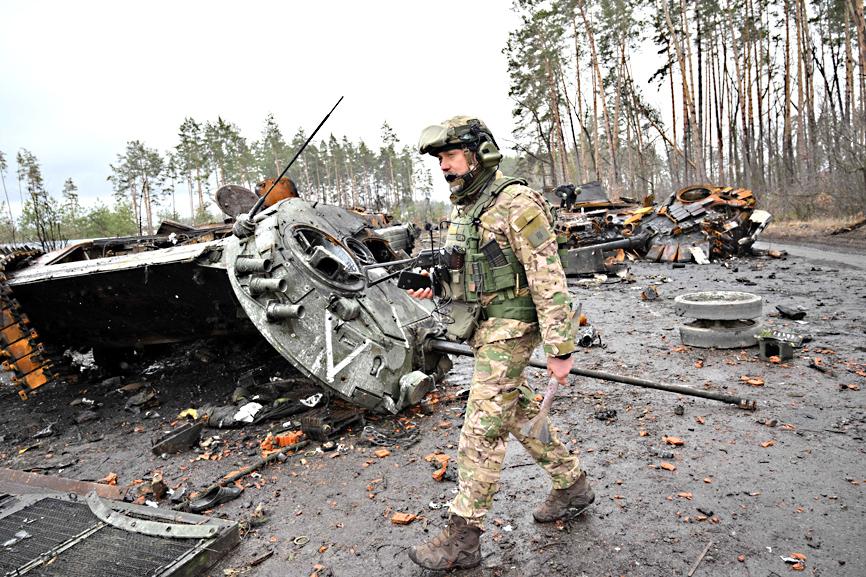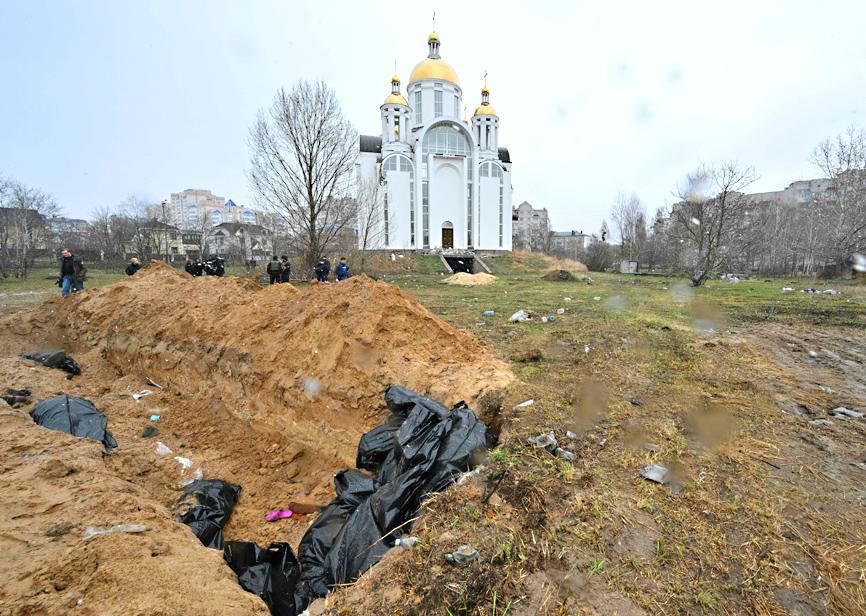EU officials yesterday said they were weighing more sanctions targeting Moscow in response to alleged atrocities against Ukrainian civilians by Russian forces that sparked a wave of international outrage.
Despite Russian denials of responsibility, condemnation was swift, with Western leaders, NATO and the UN all voicing horror at images of dead bodies in Bucha, northwest of Kyiv, and elsewhere.
Local authorities said they had been forced to dig communal graves to bury the bodies lying in the streets, including one in Bucha found with his hands bound behind his back.

Photo: AFP
Ukrainian President Volodymyr Zelenskiy called Russian troops “murderers, torturers, rapists, looters,” and said in his nightly video message that “concentrated evil has come to our land.”
EU High Representative for Foreign Affairs and Security Policy Josep Borrell said the bloc was urgently discussing a new round of sanctions as it condemned “atrocities” reported in Ukrainian towns that had been occupied by troops sent in by Russian President Vladimir Putin five weeks ago.
The proposals, which French President Emmanuel Macron said could target Russia’s oil and coal sectors, could be discussed by foreign ministers on the sidelines of a NATO meeting being held tomorrow and Thursday, or at their regular meeting early next week, an EU official said.

Photo: AFP
Borrell also offered EU assistance in documenting evidence of the alleged atrocities, and Zelenskiy said he had created a special body to investigate.
The scale of the killings is still being pieced together, but Ukrainian Prosecutor-General Iryna Venediktova said that 410 civilian bodies had been recovered so far.
Bucha Mayor Anatoly Fedoruk said that 280 bodies were placed in mass graves, because it was impossible to bury them in cemeteries still within firing range of Russian forces.
Satellite imagery firm Maxar released pictures it said showed a mass grave located in the grounds of a church in the town.
Zelenskiy’s spokesman, Sergiy Nikiforov, said the scene in Bucha “looks exactly like war crimes.”
Moscow rejected the accusations and suggested the images of corpses were “fakes,” while calling for a UN Security Council meeting on what its deputy ambassador to the body called a “heinous provocation of Ukrainian radicals in Bucha.”
“We categorically reject all allegations,” Kremlin spokesman Dmitry Peskov told reporters, but Macron said he was in favor of fresh sanctions.
“There are very clear indications of war crimes. It was the Russian army that was in Bucha,” he told France Inter radio.
British Ambassador to Ukraine Melinda Simmons said it was clear that rape had also been used as a weapon of war by Russian forces.
“Women raped in front of their kids, girls in front of their families, as a deliberate act of subjugation. Rape is a war crime,” she said.
In Germany, Chancellor Olaf Scholz’s defense minister raised the possibility of an end to gas imports.
“President Putin and his supporters will feel the consequences,” Scholz said.
However, Zelenskiy said that the worst could be yet to come as Moscow refocuses its attention on the south and east of the country, in a bid to create a land link between occupied Crimea and the Russian-backed separatist statelets of Donetsk and Lugansk.
“Russian troops still control the occupied areas of other regions, and after the expulsion of the occupiers, even worse things could be found there, even more deaths and tortures,” he said.
Additional reporting by the Guardian

Right-wing political scientist Laura Fernandez on Sunday won Costa Rica’s presidential election by a landslide, after promising to crack down on rising violence linked to the cocaine trade. Fernandez’s nearest rival, economist Alvaro Ramos, conceded defeat as results showed the ruling party far exceeding the threshold of 40 percent needed to avoid a runoff. With 94 percent of polling stations counted, the political heir of outgoing Costa Rican President Rodrigo Chaves had captured 48.3 percent of the vote compared with Ramos’ 33.4 percent, the Supreme Electoral Tribunal said. As soon as the first results were announced, members of Fernandez’s Sovereign People’s Party

EMERGING FIELDS: The Chinese president said that the two countries would explore cooperation in green technology, the digital economy and artificial intelligence Chinese President Xi Jinping (習近平) yesterday called for an “equal and orderly multipolar world” in the face of “unilateral bullying,” in an apparent jab at the US. Xi was speaking during talks in Beijing with Uruguayan President Yamandu Orsi, the first South American leader to visit China since US special forces captured then-Venezuelan president Nicolas Maduro last month — an operation that Beijing condemned as a violation of sovereignty. Orsi follows a slew of leaders to have visited China seeking to boost ties with the world’s second-largest economy to hedge against US President Donald Trump’s increasingly unpredictable administration. “The international situation is fraught

MORE RESPONSIBILITY: Draftees would be expected to fight alongside professional soldiers, likely requiring the transformation of some training brigades into combat units The armed forces are to start incorporating new conscripts into combined arms brigades this year to enhance combat readiness, the Executive Yuan’s latest policy report said. The new policy would affect Taiwanese men entering the military for their compulsory service, which was extended to one year under reforms by then-president Tsai Ing-wen (蔡英文) in 2022. The conscripts would be trained to operate machine guns, uncrewed aerial vehicles, anti-tank guided missile launchers and Stinger air defense systems, the report said, adding that the basic training would be lengthened to eight weeks. After basic training, conscripts would be sorted into infantry battalions that would take

GROWING AMBITIONS: The scale and tempo of the operations show that the Strait has become the core theater for China to expand its security interests, the report said Chinese military aircraft incursions around Taiwan have surged nearly 15-fold over the past five years, according to a report released yesterday by the Democratic Progressive Party’s (DPP) Department of China Affairs. Sorties in the Taiwan Strait were previously irregular, totaling 380 in 2020, but have since evolved into routine operations, the report showed. “This demonstrates that the Taiwan Strait has become both the starting point and testing ground for Beijing’s expansionist ambitions,” it said. Driven by military expansionism, China is systematically pursuing actions aimed at altering the regional “status quo,” the department said, adding that Taiwan represents the most critical link in China’s